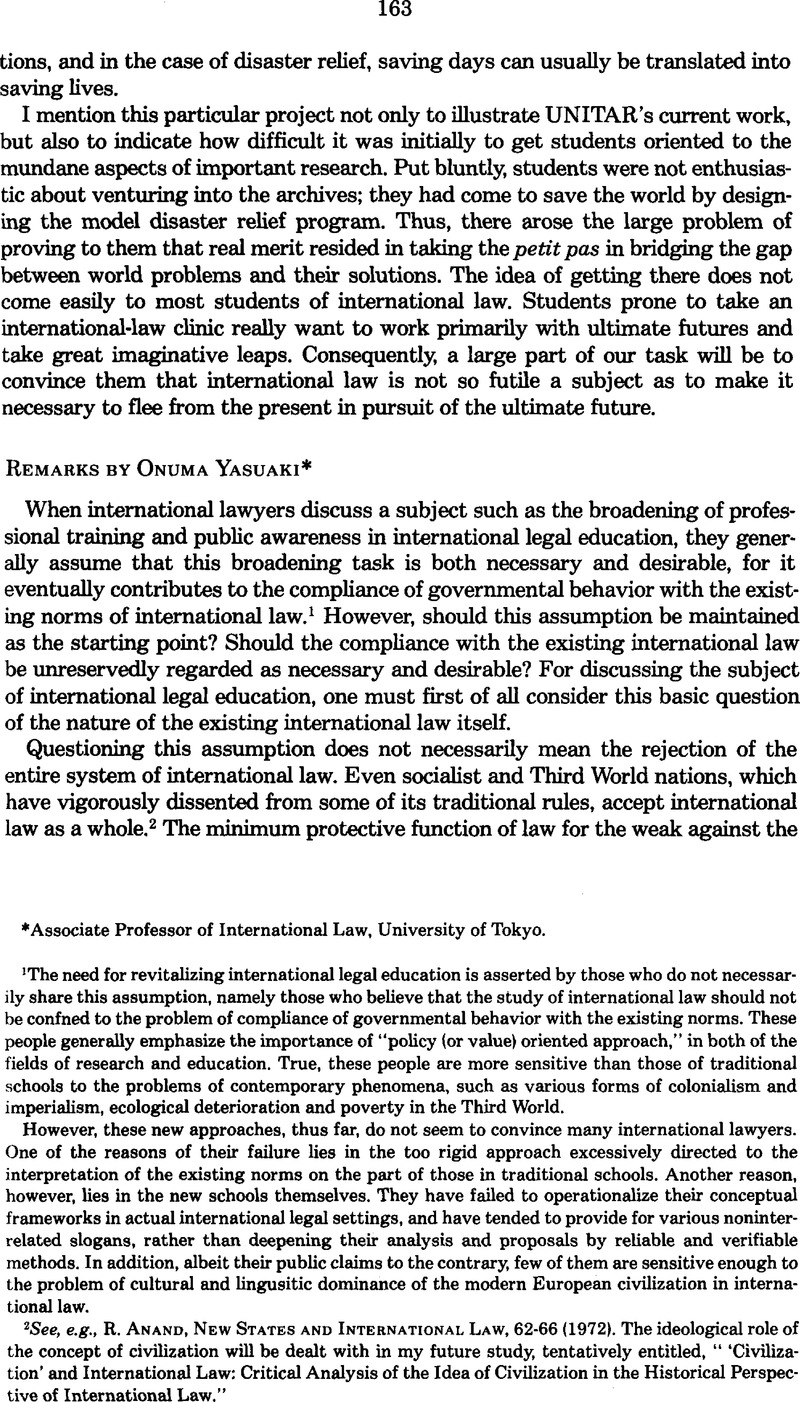No CrossRef data available.
Published online by Cambridge University Press: 28 February 2017

1 The need for revitalizing international legal education is asserted by those who do not necessarily share this assumption, namely those who believe that the study of international law should not be confned to the problem of compliance of governmental behavior with the existing norms. These people generally emphasize the importance of “policy (or value) oriented approach,” in both of the fields of research and education. True, these people are more sensitive than those of traditional schools to the problems of contemporary phenomena, such as various forms of colonialism and imperialism, ecological deterioration and poverty in the Third World.
However, these new approaches, thus far, do not seem to convince many international lawyers. One of the reasons of their failure lies in the too rigid approach excessively directed to the interpretation of the existing norms on the part of those in traditional schools. Another reason, however, lies in the new schools themselves. They have failed to operationalize their conceptual frameworks in actual international legal settings, and have tended to provide for various noninterrelated slogans, rather than deepening their analysis and proposals by reliable and verifiable methods. In addition, albeit their public claims to the contrary, few of them are sensitive enough to the problem of cultural and lingusitic dominance of the modern European civilization in international law.
2 See, e.g.,R. Anand, New States And International Law, 62-66 (1972). The ideological role of the concept of civilization will be dealt with in my future study, tentatively entitled, “ ‘Civilization’ and International Law: Critical Analysis of the Idea of Civilization in the Historical Perspective of International Law.“
3 SeeKunz, Zum Begriff der ‘nation civilisee’ im modernen Volkerrecht,7 Zeitschrift Fur Ofpentliches Recht 86, 95 (1927-28); Schwarzenberger, The Standard of Civilization in International Law,8 Current Legal Problems 212, 220, 227 (1955).
4 The percentage of excerpts in American casebooks that are drawn from Anglo-American writings are as follows: W. Bishop, International Law: Cases And Materials (3rd ed. 1971): 98 percent B. Weston, R. Falk & A. D'Amato, International Law And World Order: A Problem- Oriented Coursebook (1980): more than 75 percent L. Henkin, R. PUGH, O. Schachter & H. Smit, International Law: Cases And Materials (1980): more than 75 percent
5 This can be explained partly by the fact that since the study of international law has been so dominated by European and American scholars, the numerical distribution of the works selected merely reflects this dominance. However, one may still wonder why so few works of non-Englishspeaking scholars are adopted, even though they are regarded as distinguished scholars of international law. For example, one cannot find works of such distinguished scholars as Abi-Saab, Bokor-Szego, Deblez, Guggenheim, Morelli, Reuter, Roling, Rousseau, Scelle, Schmitt, Schwarzenberger, Sinha, Tabata, Taoka, Verdross, Wengler and Yokota. Writings of Kelsen, Mosler, Stone, Virally, and de Visscher are found only once or twice in those casebooks as compared with over 30 excerpts from Hackworth, more than 20 from Henkin, more than 10 from Briefly, Falk, Friedmann and McDougal.
6 There are very few translations of works written in German in Henkin et al'sCasebook. There is none in either Weston et al'sor Bishop's.
7 Basic Documents inInternational Law And World Order by Weston et alis relatively good in this respect, successfully collecting “aspirational” documents. Even this collection, however, can be significantly improved, given its worldorientation.
8 See, in general, K. Panikkar, Asia And Western Dominance (1953, 3rd Ed. 1959); G. Barraclough, History In A Changing World (1955); Monteil, La Decolonisation de la Histore,142 PREUVES 3-12 (1962); G. LECLERC, Anthropologie Et Colonialisme (1972); I. Sachs, La Deconverte Du Tiers Monde (1976); E. Said, Orientalism (1978).
9 F. Fanon, Les Damnes De La Terre 167 (1961).
10 See,in this respect, R. Jaulin, La Paix Blanchie: Introduction A L'ethnocide (1970).